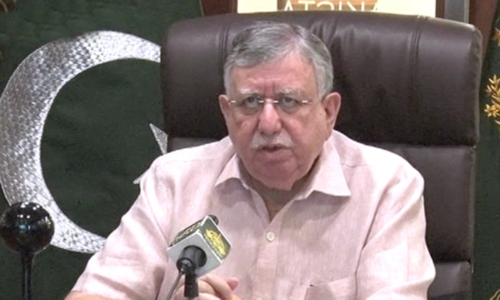ISLAMABAD: The Economic Coordination Committee (ECC) of the Cabinet on Wednesday approved import of 200,000 tonnes of sugar and 400,000 tonnes of wheat and Rs24.555 billion supplementary grant for procurement of Covid-19 vaccines.
The meeting, presided over by Finance Minister Shaukat Tarin, waived duties on import of spray drones from China.
The ECC approved import of 200,000 tonnes of sugar with immediate effect through the Trading Corporation of Pakistan (TCP) out of an already approved quantity of about 600,000 tonnes for strategic reserves to contain price hike. The meeting was told that 100,000 tonnes of sugar had already been imported while tenders for another 200,000 tonnes had to be cancelled due to higher international prices that worked out at about Rs102-103 per kg.
The secretary of the industries and production ministry briefed the ECC about previous tenders floated for the purchase of sugar in the international market and the decision for cancellation of these tenders due to volatility in the prices of commodities in the international market, particularly caused by Covid-19 pandemic. He cited rising transportation cost and petroleum prices as factors contributing to price hike of food commodities in international market.
The finance minister decided to constitute a sub-committee comprising the secretaries of industries, commerce, finance and law, to hold a consultative session and work out modalities for placing tenders in international market in a timely manner to get most affordable price for importing food items to save precious foreign exchange reserves of the country.
He also directed the authorities to present recommendations for improving the overall estimation process for commodities’ prices by the provinces through forecasting on scientific basis where price risk was involved. Proper estimates should be presented for import of particular food items to fulfil all codal formalities in a timely manner, he stressed.
The committee directed the officials concerned to workout arrangements for import of the remaining 300,000 tonnes of sugar through government-to-government mode of procurement at the earliest possible to build strategic reserves and ensure smooth supply of sugar across the country before the arrival of the fresh sugarcane crop. Similarly, the ECC also approved the corresponding financial arrangement for the import of 200,000 tonnes of sugar through the TCP.
The meeting, on the recommendation of the Ministry of National Food Security and Research, approved the import of 400,000 tonnes of wheat also for strategic reserves. It directed the officials concerned to explore and expedite the option for importing the remaining amount of wheat through government-to-government arrangement.
The ECC emphasised the importance of building strategic reserves in the wake of evolving situation in Afghanistan which may affect the prices in the domestic market.
The ECC also approved a technical supplementary grant (TSG) of about Rs24.555bn ($150 million) to the National Disaster Management Authority (NDMA) for procurement of Covid-19 vaccines, including transportation and handling charges, to meet the target of vaccination of 85m people by the end of current.
The ECC also approved a request for a TSG by the NNDMA for extending humanitarian assistance to Syria in the form of food items. The ECC allowed procurement of 200 tonnes each of rice and flour worth about Rs44.24m through the Ministry of Foreign Affairs.
The Ministry of National Food Security & Research presented a summary before the ECC to waive off taxes and duties on the import of 12 drones donated by the Ministry of Agriculture and Rural Affairs of China for controlling desert locust in Pakistan. The committee approved the summary for exemption of all applicable duties and taxes.
The meeting also approved another TSG to the Ministry of National Health Services, Regulations and Coordination amounting to Rs2.376bn for the Expanded Programme on Immunisation (EPI) for the FY 2021-22 as the EPI is a high-priority government initiative which aims to immunise more than seven million children under one-year of age against 10 vaccine preventable diseases.
Published in Dawn, August 26th, 2021














































